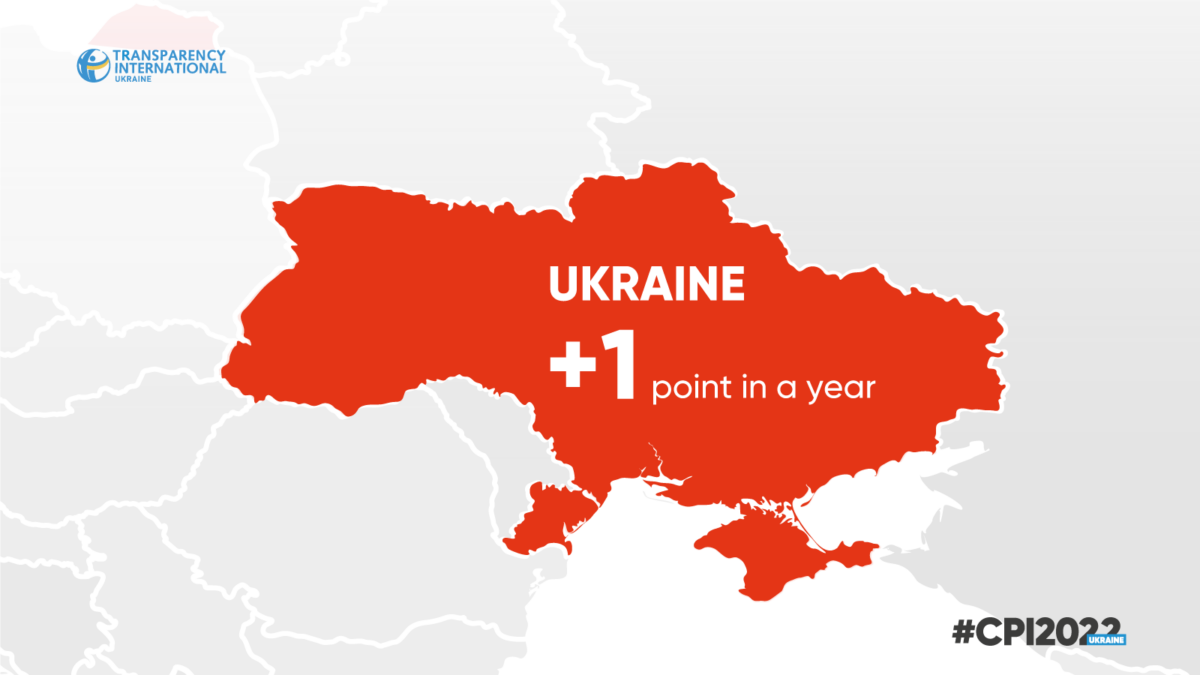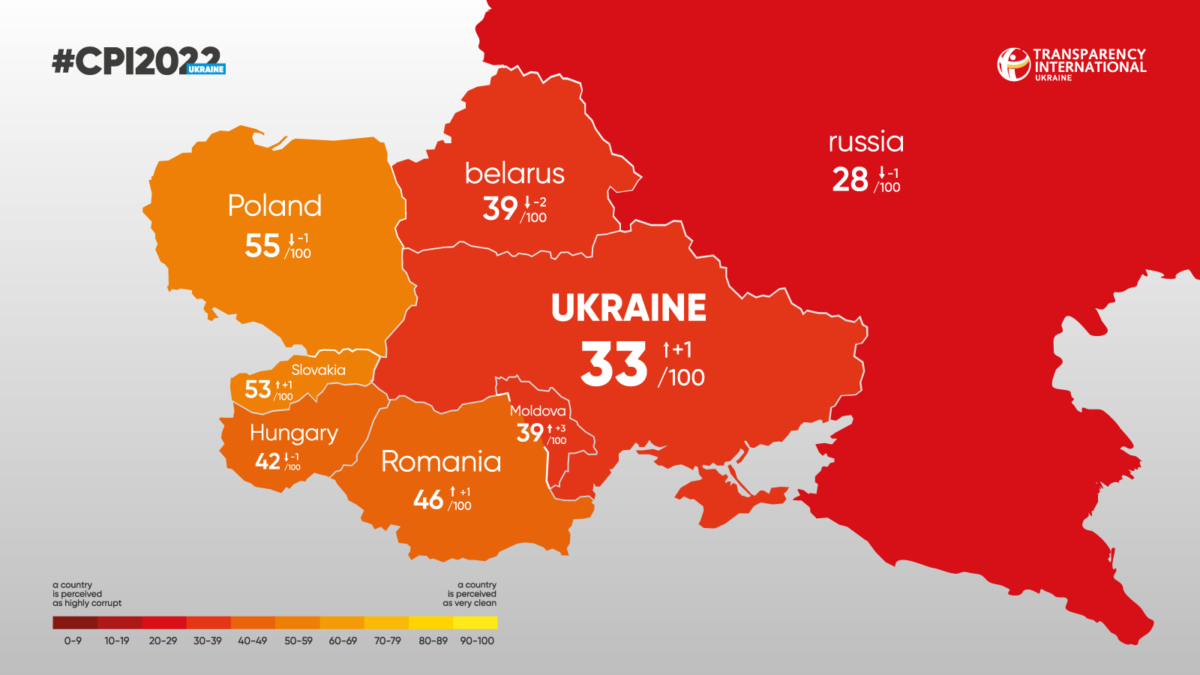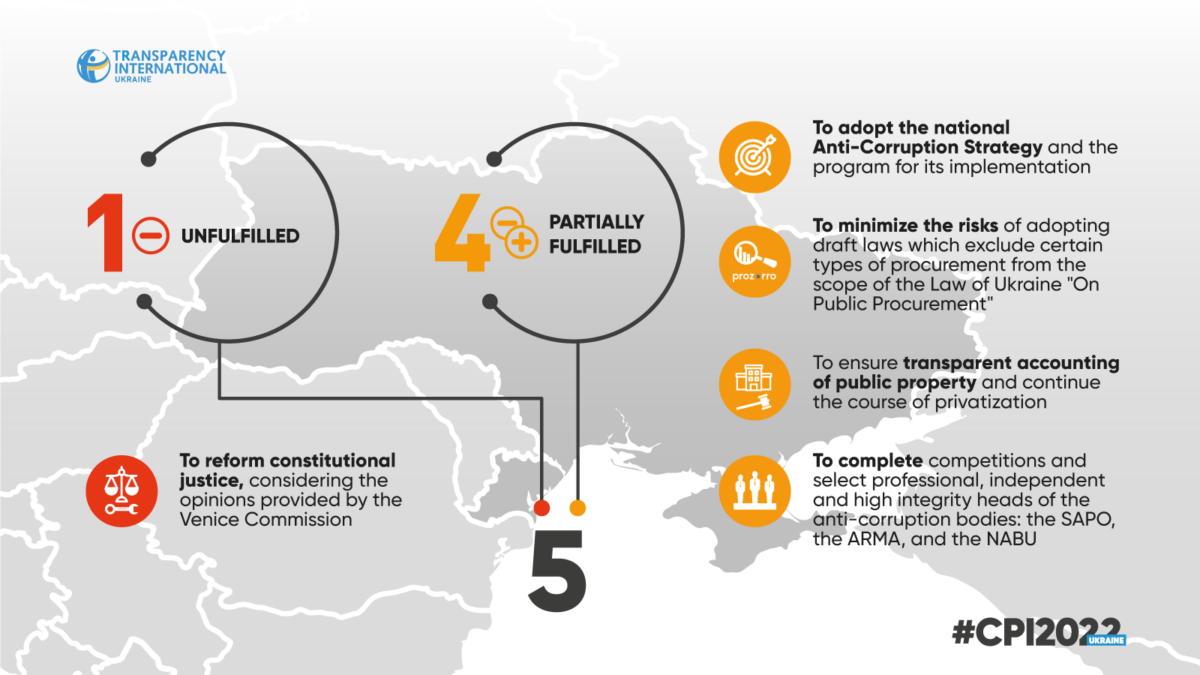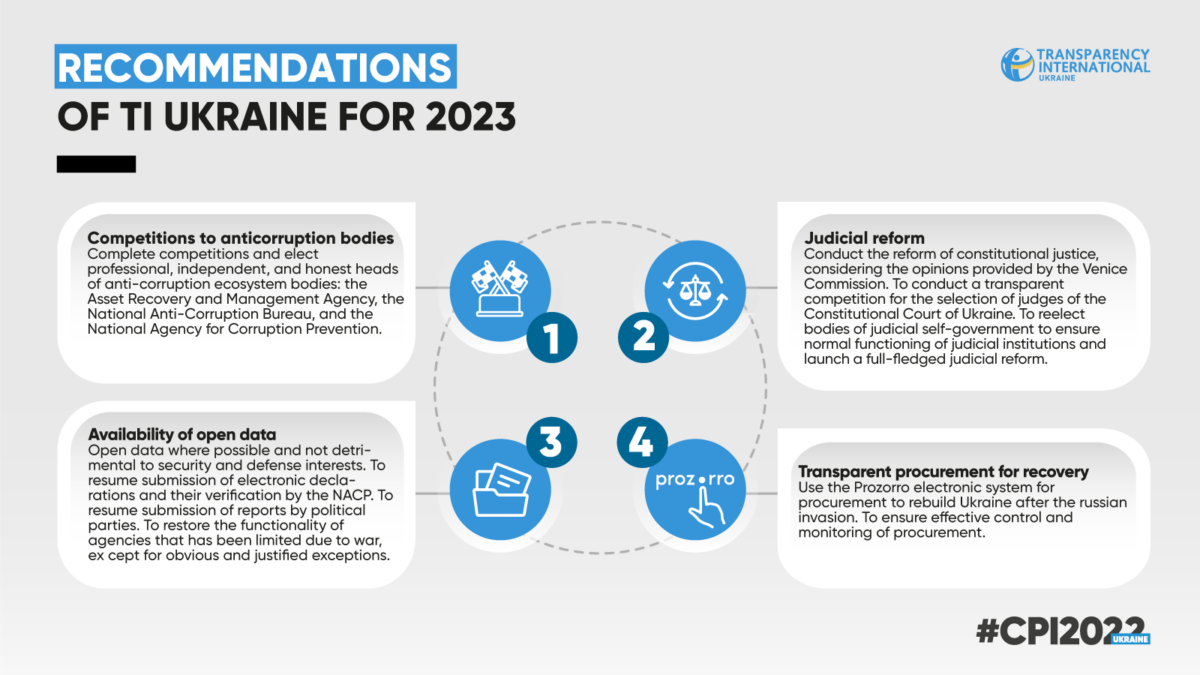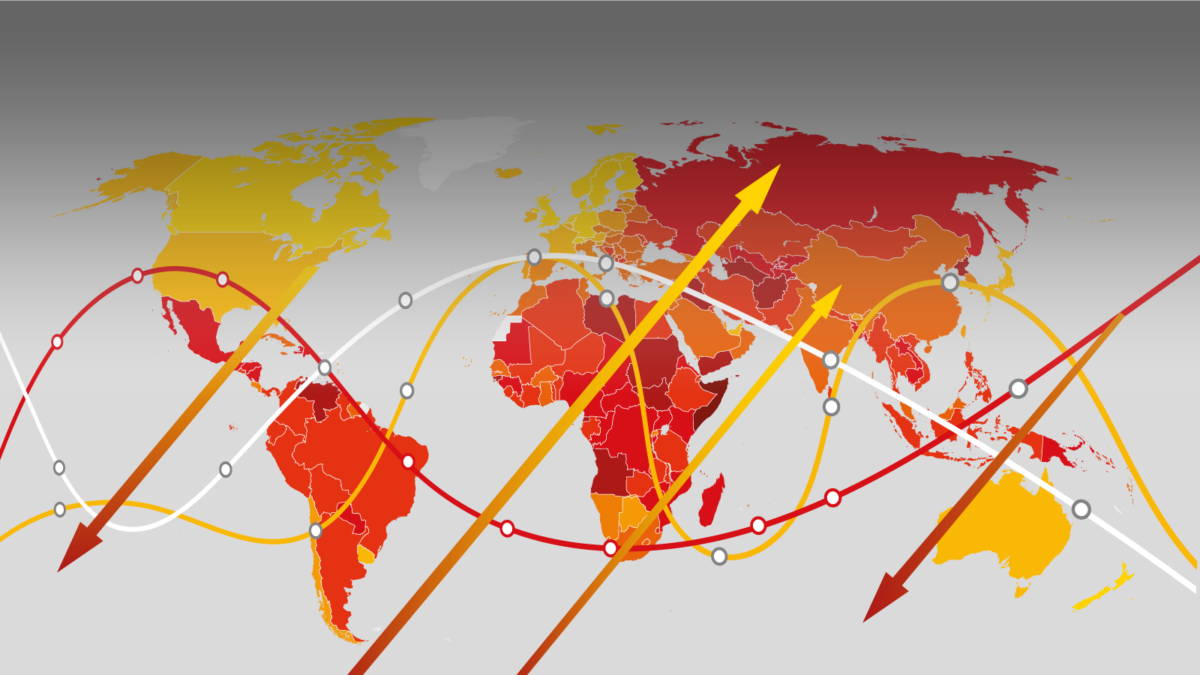

Ukraine received 33 points out of 100 in the Corruption Perceptions Index (CPI) for 2022. Our score has increased by one point, and now Ukraine ranks 116th out of 180 countries in the CPI.
Algeria, Angola, Zambia, Mongolia, El Salvador, and the Philippines also have 33 points. Bosnia and Herzegovina, the Gambia, Indonesia, Malawi, Nepal, Sierra Leone are one point ahead of us — they all have 34 points. Dominican Republic, Kenya, and Niger have one point less than Ukraine.
Among the neighbors, Ukraine still ranks higher only than russia — the terrorist country lost 1 point in 2022 and, with 28 points, now ranks 137th. In addition, the points of Hungary fell again — 42 points (-1, 77th ), and those of the russian satellite belarus as well. The latter has lost 2 points this year.
Among the friends of Ukraine, there are changes in indicators as well. Poland lost 1 point, but remained the leader of CPI among our neighbors — with 55 points, it ranks 45th. Slovakia managed to improve its indicators — 53 points (+1, 49th), Romania — 46 points (+1, 63rd) and Moldova, whose indicators increased the most — +3, and now it ranks 91st with 39 points.
Despite the russian invasion, our country has shown that its progress in the fight against corruption is a sustainable process that continues even in the most difficult period of the state's existence.
What Do the Results of the Ukrainian CPI Mean in the Context of the War?
33 points scored by Ukraine in 2022 is the highest indicator of our country since the launch of the updated CPI methodology. Thus, over the past 10 years, the indicator of Ukraine has increased by 8 points.
Despite the russian invasion, our country has shown that its progress in the fight against corruption is a sustainable process that continues even in the most difficult period of the state’s existence.
Among the undoubted positive results of the past year are the adoption of the State Anti-Corruption Strategy, the long-awaited appointment of the head of the Specialized Anti-Corruption Prosecutor’s Office (SAPO), which became a driving force for intensifying investigations into high-profile corruption. Moreover, the High Anti-Corruption Court showed its effectiveness — in 2022, the court considered 49 cases, 37 of which resulted in sentences.
However, the growth of Ukraine in recent years could have been much more noticeable, and the effect of the fight against corruption — more tangible.
Had the competition for the election of the SAPO head not been delayed, but had ended, as it should have, in 2021, when the name of the winner was already known, anti-corruption investigations would have intensified earlier. Had the parliament not delayed the adoption of the Anti-Corruption Strategy for 2 years, Ukraine would have received a clear action plan in the fight against corruption much earlier.
Had the anti-corruption bodies had full operational and institutional capacity (the actual possibility of wiretapping for the NABU, access to proper forensic expertise, expanding the powers of the SAPO, providing for audits of all anti-corruption bodies), the anti-corruption system, which survived during the full-scale war, would work more effectively.
The growth of Ukraine in recent years could have been much more noticeable, and the effect of the fight against corruption — more tangible.
What Influenced This Year’s Performance of Ukraine?
The growth of Ukraine by one point is a change within the margin of error, so, we should consider the results over several years. Our country shows positive dynamics, even despite the military aggression of russia.
This year, the results of Ukraine were calculated based on 8 studies (one less than last year). One of them (World Economic Forum Executive Opinion Survey 2021) showed a significant increase in Ukraine’s indicator. Another one (The PRS Group International Country Risk Guide 2022) showed a slight decrease in indicators, while in the other 6 studies, the indicators did not change.
The World Economic Forum Executive Opinion Survey 2021, according to which Ukraine has increased its score by 9 points, was conducted in April-October 2021 and covered the opinions of 12,550 business leaders in 124 countries. This study considers the opinion of entrepreneurs about the prevalence of bribes in the country. However, according to the terms of the survey, such trends were observed even before the full-scale invasion of russia into Ukraine. Moreover, the indicators could be influenced by positive changes in public procurement, effective privatization of public property, etc.
At the same time, The PRS Group International Country Risk Guide 2022, according to which Ukraine lost 2 points, was conducted from September 2021 to August 2022 and considers the assessment of corruption in the political system during the war as well. In particular, this study pays special attention to existing or potential corruption in the form of excessive selective protection, nepotism, booking jobs, trade turnover, secret financing of parties, and suspiciously close ties between politics and business.
Since Ukraine has suspended the obligation of political parties to submit financial and other reports for NACP verification, in our opinion, this could have led to a decrease in the scores under this study.
If we consider other studies that affected Ukraine’s performance in the CPI, then Freedom House Nations in Transit for 2021 positively mentions the restoration of proper criminal liability for false declarations in the summer of 2021. However, it is noted that in 2021, anti-corruption bodies experienced attempts to weaken their independence and institutional capacity, and the Specialized Anti-Corruption Prosecutor’s Office did not have a head due to a delayed competition. The unreformed sector of justice, prosecutor’s office, and law enforcement agencies is also mentioned as a threat to the stability of anti-corruption bodies. This also covers the lack of obligation of political parties to submit reports to the NACP. Therefore, according to this study, the score of Ukraine for the year has not changed.
Corruption can undermine political, social, and economic stability and ultimately threaten peace and security in general.
Recommendations of Transparency International Ukraine for 2022: What Has Been Implemented?
According to the results of last year’s CPI, Transparency International Ukraine provided the authorities with 5 specific recommendations, the implementation of which could improve our performance in the study. None of these recommendations were fully implemented, four were partially implemented, and one was not implemented at all.
Partially implemented:
- Complete the competitions and select professional, independent, and honest leaders of the anti-corruption ecosystem: the Specialized Anti-Corruption Prosecutor’s Office, the Asset Recovery and Management Agency, and the National Anti-Corruption Bureau;
- Adopt the State Anti-Corruption Strategy and the program for its implementation;
- Ensure transparent accounting of public property and continue on the path to privatization;
- Minimize the risks of adopting draft laws that remove procurement from the scope of the Law of Ukraine “On Public Procurement”.
Not implemented:
- Conduct the reform of constitutional justice, considering the opinions provided by the Venice Commission.
Read a detailed analysis of the implementation of recommendations in the full text of the study.
None of our recommendations were fully implemented, four were partially implemented, and one was not implemented at all.
Recommendations of TI Ukraine for 2023, Which Will Help Reduce the Level of Corruption
Transparency International Ukraine offers 4 comprehensive steps that will help improve the level of anti-corruption and contribute to the effective recovery of Ukraine in 2023.
Corruption also creates fertile ground for organized criminal activity, even terrorism, as criminals are aided in their illegal activities by the complicity of corrupt officials.
Global trends in corruption perception in 2022
Corruption, conflict, and security are the focus of this year’s CPI. Last year’s findings showed that corruption can undermine political, social, and economic stability and ultimately threaten peace and security in general. At the same time, corruption also creates fertile ground for organized criminal activity, even terrorism, as criminals are aided in their illegal activities by the complicity of corrupt officials.
The Corruption Perceptions Index 2022 shows that most countries have not made significant progress in the fight against corruption in more than 10 years. However, the scale of the problem is enormous: the global average remains unchanged at 43 points out of 100 for the eleventh year in a row, and more than two-thirds of countries (122) have serious problems with corruption, scoring less than 50 points.
Transparency International has developed global and universal guidelines for all governments. These tips will help ensure an effective fight against corruption, help avoid armed conflicts and guarantee the safety of citizens of different countries.
Address the threats that corruption and illicit finance pose to peace and security core business of political leaders, and an integral focus of both foreign and domestic policy.
Reinforce checks and balances and promote separation of powers to insulate against corrupt control and ensure that no branch can consolidate authority. Governments must sufficiently resource anti-corruption agencies and oversight institutions, and pay special attention to risks within defense and security institutions, as identified in the Government Defense Integrity Index (GDI).
Share and uphold the right to information, so the public knows where public spending is going and how resources are distributed, leaving this open to scrutiny from journalists and civil society. In cases of sensitive information, there must be rigorous and clear guidelines for withholding it, including in the defense sector.
Limit private influence by regulating lobbying and promoting open access to decision-making so that policies are determined by fair and public processes. This means establishing public registers of lobbyists so that the public can scrutinize who is lobbying and identify conflicts of interest.
Combat transnational forms of corruption to stop kleptocrats and protect the common good. Top-scoring countries need to clamp down on corporate secrecy, foreign bribery and complicit professional enablers. They must also take advantage of new ways of working together, initiated after the Russian invasion of Ukraine, to make sure that illicit assets can be effectively traced, investigated, confiscated and returned to the victims.
Most countries have not made significant progress in the fight against corruption in more than 10 years.
CPI: How It Works
Corruption Perceptions Index (CPI) is a ranking calculated by the global organization Transparency International since 1995. The organization itself does not conduct its own surveys. The Index is calculated based on 13 studies of reputable international institutions and think tanks.
The key indicator of the Index is the score, not the rank. The minimum score (0 points) means that corruption effectively replaces the government, while the maximum (100 points) indicates that corruption is almost absent. The index assesses corruption only in the public sector.
CPI considers the point of view of businesses, investors, market researchers, etc. CPI reflects the opinion of the private sector and its perception of corruption in the public sector.
It is important to keep in mind that CPI measures perception of corruption, not the actual level of corruption. A higher score in one country than in another does not mean that the former has less corruption than the latter — it means that the former is perceived as less corrupt.
The CPI methodology received a seal of approval from the European Commission for its reliable statistical approach.
CPI covers perception of corruption in the public sector by experts, including: bribery, embezzlement of public funds, nepotism in the civil service, capture of the state, the government’s ability to implement integrity mechanisms, effective prosecution of corrupt officials, excessive bureaucracy, availability of adequate laws on financial disclosure, prevention of conflicts of interest and access to information, ensuring the protection of whistleblowers, journalists and investigators.
The key indicator of the Index is the score, not the rank.




